The Middle East has faced political tension, military conflicts and other disputes for many years. It is, as a result, a region with one of the most enduring conflicts in the world. The EU has set out its policy on the Middle East in a series of high-level public statements including the Venice Declaration of 1980, the Berlin Declaration of 1999, the Seville Declaration and the Roadmap for Peace of 2002, as well as multiple Council conclusions.1 Against this backdrop, ongoing environmental challenges have severely affected local communities and showcased their transboundary repercussions on neighbouring regions and countries including Palestine*, Israel and Jordan. Hence, in spite of regional conflicts, a new ground for cross-border collaboration has emerged with joint research providing supranational solutions to environmental issues.
Biodiversity, waste management, energy, food security, water and sanitation challenges in Gaza and the West Bank have led Israeli and Palestinian researchers, community developers, diplomats and professionals from different fields to develop and implement collaborative innovative cross-border projects. Their joint efforts aim to improve the livelihoods of local communities and marginalised groups – those who are often the most vulnerable to environmental challenges. In this endeavour, the EU provides its support in line with the European Neighbourhood Policy, the main framework for developing political and economic relations with both Israel and Palestinian Authority.
The EU Peacebuilding Initiative (EUPI) Programme aims to support and promote the conditions for a sustainable resolution of the Israeli-Palestinian conflict through civil society and positive citizen engagement.2 This is realised by, among others, financing civil society initiatives in Israel, Palestine, and to a minor extent abroad when directly involving Israeli and/or Palestinians such as the TRACK II Environmental Forum for Applied Diplomacy (TRACK II) project3 and the Unity and Diversity in Nature and Society (UDNS) project.4 Both are funded under EUPI and serve as exemplary interventions in the region, placing research at the forefront of cross-border collaboration and involving multiple stakeholders including civil society, local communities, authorities, university students and researchers.
TRACK II Environmental Forum for Applied Diplomacy
Led by the Arava Institute for Environmental Studies5, TRACK II departs from traditional peace-building efforts in the region, which have aimed to establish over-arching peace agreements. By promoting initiatives taken on the professional level, it strives for positive change on the ground and in the political arena. The projects under TRACK II focus mainly on water and waste management, energy and food security in Gaza, the West Bank and Jordan. “Climate change is a global challenge and no country can face such challenges on its own, as shown by the COVID-19 pandemic. Our region is a hotspot for climate change. That was the main motivation for Track II”, says Dr Tareq Abu Hamed, CEO of the Arava Institute for Environmental Studies.
Best practices – “TRACK II Environmental Forum for Applied Diplomacy”:
- Implementing a grassroots innovative approach
- Empowering the local communities to manage new technologies
- Mediating as reliable partner among stakeholders from both sides
1. Implementing a grassroots innovative approach
After identifying common ground for cooperation, the Arava Institute and its partners designed the model of TRACK II, which is research-based and looks at two main modules: physical infrastructure (related to water, waste, energy) and social infrastructure (linked to education, public health, food security & resilience, economic growth, employment opportunities etc.). TRACK II’s methodology and structure is bottom-up. “Our projects are low-scale, off-grid because solving the big and challenging issues takes too much time, too many processes, too much bureaucracy. We found out that highly robust, small-scale projects can be successful in creating trust between the parties and generating commitment”, says Jesica Scheimberg, Track II Forum Manager for Project Development and Operation.
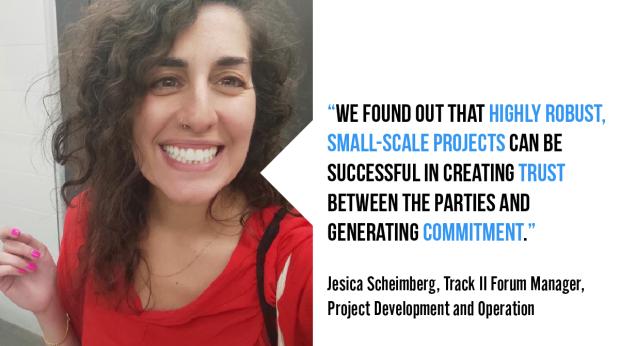
Several projects are currently implemented in Gaza and, more specifically, in municipalities such as Khan Younis and Abasan. The WasteWater Treatment System (WWTS) is one of those, treating around 100m³ per day. It is an off-grid project – managed and operated by solar panels – and assists in mitigating the effects of untreated wastewater, one of the severe challenges in Gaza. At the same time, WWTS is an example of “community modelling”, meaning it is owned, managed and sustained by the local communities. The wastewater to be treated by the WWTS will eventually be used by local farms for purposes such as production, crops, green feed for animals and different types of food identified by the local communities. These farms will be managed by diverse civil society organisations.
2. Empowering the local communities to manage new technologies
To enable the local communities make use of the new technologies and models, the Arava Institute and its partners are dedicated to providing training and capacity-building opportunities for relevant stakeholders. As Jesica Scheimberg mentions “we organise programmes of training for which we invite professionals, experts, government officials, among others, to come and learn how to use these technologies but also to bring their knowledge about advanced technologies, renewable energy, wastewater management etc.”
3. Mediating as reliable partner among stakeholders from both sides
A key factor in TRACK II’s success is the fact that the Arava institute has worked over the years to earn the trust of partners and local communities. According to Jesica Scheimberg “We have the role of a mediator, bringing the voices of one side to the other side. In most cases both sides are interested in solving the common challenges. Through our silent, humble and out-of-the-spotlight work we have created these strong projects and built trust. Today we are in a position where we receive requests from the Israeli side to solve the issue of batteries and solid waste, for example. At the same time, we also receive requests from the Palestinian side. In Gaza, for instance, after the success of the projects in the Abasan municipality, Palestinians come to us asking for these technologies and our help. The same happens in the West Bank, too.”
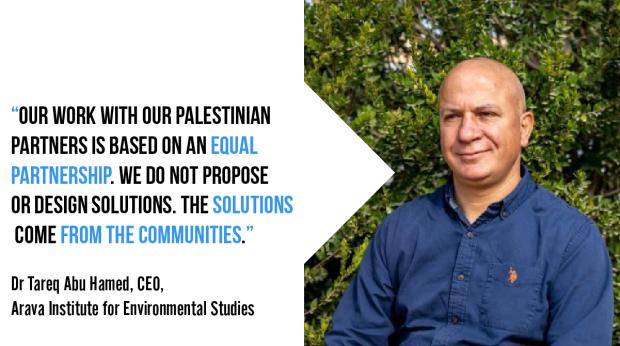
Forging work relationships on the basis of an equal partnership has also contributed to building trust. Dr Tareq Abu Hamed explains, “our work with our Palestinian partners is based on an equal partnership. They are strong because they know the field, the culture, the religion, the geography, the communities. The solutions come from the communities, from the ground. We do not propose or design solutions. We help the communities implement the solutions and do capacity-building. This helps in making our partners feel that we have an equal relationship and partnership.”
Unity and Diversity in Nature and Society
UDNS is implemented by the University of Bethlehem in partnership with the Galilee Society and the Rapprochement Centre. The project aims to promote joint Israeli-Palestinian action focused on the sustainability of human and natural systems valuing diversity (agricultural, human and natural), which in turn increases respect for both nature and each other.
Best practices – “Unity and Diversity in Nature and Society”
- Boosting the cross-fertilisation of ideas by expanding resources and involving the youth
- Education and awareness raising among the local communities
1. Boosting the cross-fertilisation of ideas by expanding resources and involving the youth
To create the right conditions and prerequisites for research to flourish, UDNS leverages and expands resources by establishing three research centres: the Biodiversity Centre at the Palestine Institute for Biodiversity and Sustainability (opened in June 2021); the Human Culture and Diversity Centre at the Rapprochement Centre (opened in August 2021); and the Education Centre at the Galilee Society (opened in October 2021). Each centre is a venture that brings expertise from Israelis and Palestinians – whether affiliated with any of the three partner organisations or other Israeli and Palestinian expertise – and adds to collaborative R&D advancements.
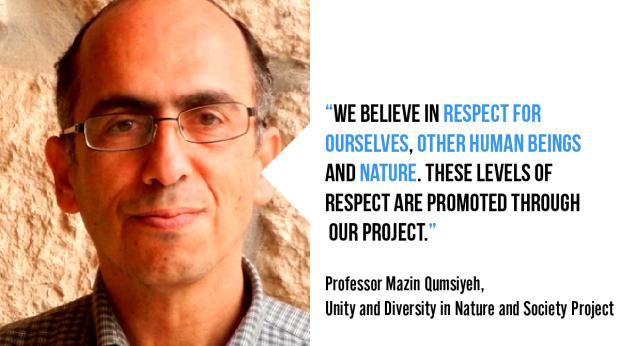
These centres are working collaboratively, with the first part of the project focusing primarily on research production. As Mazin Qumsiyeh, Professor at Bethlehem University and Project Lead, mentions “Good research results have already been produced. At the Biodiversity Centre for example, we have produced more research outputs than initially proposed to the EU. The Centre is the first in the region to use advanced molecular technologies for environmental monitoring.”
Additionally, there is a budget for the involvement of young researchers. Professor Mazin Qumsiyeh points out “We have planned open calls encouraging young researchers to work with the three centres, but also to work collaboratively with other young researchers through the establishment of a bonus points system.”
2. Education and awareness raising among the local communities
Once research has borne fruits, education modules are expected to be designed based on research findings; such findings will serve the project’s underlying concept: research – education & awareness raising – and behavioural change. The awareness raising and education efforts will cover both sides of the green line and will include a number of online and offline activities such as cross-visits and conferences for research dissemination and new collaborations. Furthermore, in the third year of the project lifespan when educational materials and activities will be developed based on the research outputs, the team plans a mobile education unit. Professor Mazin Qumsiyeh explains the idea behind this digital initiative: “Instead of waiting for the people to come to the three research centres, we want to go to them. We aim to reach the remote villages.”
Building on the work already done
Both teams of UDNS and TRACK II are leveraging the work that has already been completed, with the support of the EUPI programme, by informing national policies and institutionalising their activities. The UDNS project team was selected by the environmental quality authorities in Palestine to draft the 6th National Report on the Convention of Biological Diversity (CBD) as well as to review, revise and update the National Biodiversity Strategy and Action Plan. As for TRACK II, it enters a new era with the establishment of the new Centre for Applied Environmental Diplomacy, which according to Dr Tareq Abu Hamed “is the first of its kind in the world”. The Centre, which is a natural outcome of TRACK II’s model and activities, operates in both Israel and Palestine and has an international advisory board consisting of well-known and impactful stakeholders. “We are approaching a new era of institutionalising our work. We are bringing a new proposal in the region which could be replicated in other regions of the Middle East and the world by observing how environmental mutual concerns and initiatives in physical and social developments can lead to strong diplomacy and cooperation’’, says Jesica Scheimberg.
Click on the play button below to watch our video on cross-border collaboration in the Middle East for environmental sustainability
Have you been involved in cross-border environmental partnerships in conflict-affected regions? What approach was implemented?
Did you meet any challenges, and how did you address them?
Leave your comment below!
Credit: Video © Capacity4dev | Photo © European Union 2017 / Johanna de Tessieres
* The European Commission support for the production of this publication does not constitute endorsement of the contents which reflects the views only of the authors, and the Commission cannot be held responsible for any use which may be made of the information contained therein.
1 For example, see the Council conclusions of 22 July 2014.
2 The EU Peacebuilding Initiative (EUPI) Programme is the EU people to people (P2P) regional civil society programme aiming at supporting local and international civil society initiatives that promote peace, tolerance and non-violence in the Middle East, and ultimately the EU's position on the Middle East Peace Process.
3 TRACK II works to enable key civil society organizations and individuals who represent both state and non-state actors to discuss, negotiate, and develop practical cross-border strategies to facilitate formal and informal environmental agreements between Israel, Palestine and Jordan.
4 The two projects are separate but implemented in the region with EU support.
5 The Arava Institute has five research centres: Centre for Renewable Energy and Energy Conservation, Centre for Transboundary Water Management, Centre for Sustainable Agriculture, Centre for Arid Socio-Ecology & the Jordan-Israel Center for Community, Environment & Research.
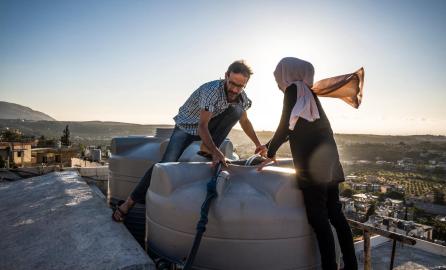



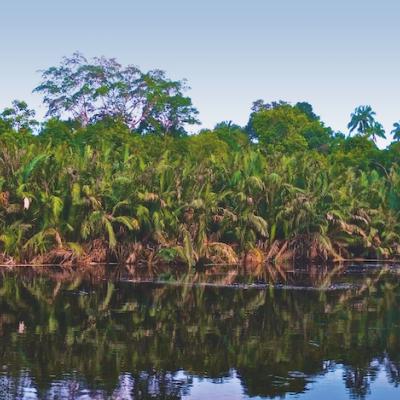

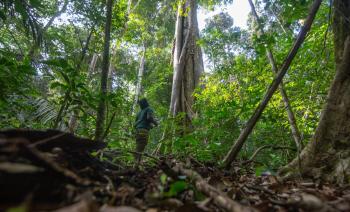
Log in with your EU Login account to post or comment on the platform.